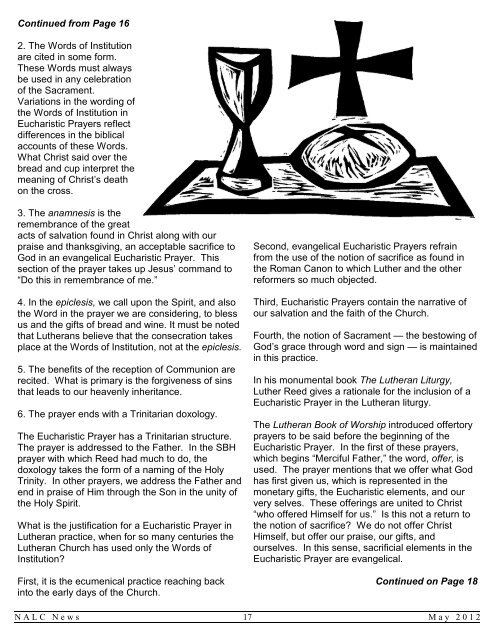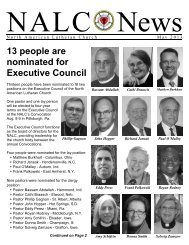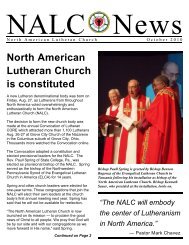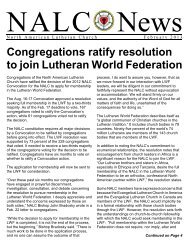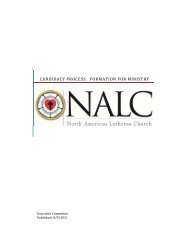May 2012 - North American Lutheran Church
May 2012 - North American Lutheran Church
May 2012 - North American Lutheran Church
Create successful ePaper yourself
Turn your PDF publications into a flip-book with our unique Google optimized e-Paper software.
Continued from Page 16<br />
2. The Words of Institution<br />
are cited in some form.<br />
These Words must always<br />
be used in any celebration<br />
of the Sacrament.<br />
Variations in the wording of<br />
the Words of Institution in<br />
Eucharistic Prayers reflect<br />
differences in the biblical<br />
accounts of these Words.<br />
What Christ said over the<br />
bread and cup interpret the<br />
meaning of Christ’s death<br />
on the cross.<br />
3. The anamnesis is the<br />
remembrance of the great<br />
acts of salvation found in Christ along with our<br />
praise and thanksgiving, an acceptable sacrifice to<br />
God in an evangelical Eucharistic Prayer. This<br />
section of the prayer takes up Jesus’ command to<br />
“Do this in remembrance of me.”<br />
4. In the epiclesis, we call upon the Spirit, and also<br />
the Word in the prayer we are considering, to bless<br />
us and the gifts of bread and wine. It must be noted<br />
that <strong>Lutheran</strong>s believe that the consecration takes<br />
place at the Words of Institution, not at the epiclesis.<br />
5. The benefits of the reception of Communion are<br />
recited. What is primary is the forgiveness of sins<br />
that leads to our heavenly inheritance.<br />
6. The prayer ends with a Trinitarian doxology.<br />
The Eucharistic Prayer has a Trinitarian structure.<br />
The prayer is addressed to the Father. In the SBH<br />
prayer with which Reed had much to do, the<br />
doxology takes the form of a naming of the Holy<br />
Trinity. In other prayers, we address the Father and<br />
end in praise of Him through the Son in the unity of<br />
the Holy Spirit.<br />
What is the justification for a Eucharistic Prayer in<br />
<strong>Lutheran</strong> practice, when for so many centuries the<br />
<strong>Lutheran</strong> <strong>Church</strong> has used only the Words of<br />
Institution?<br />
First, it is the ecumenical practice reaching back<br />
into the early days of the <strong>Church</strong>.<br />
Second, evangelical Eucharistic Prayers refrain<br />
from the use of the notion of sacrifice as found in<br />
the Roman Canon to which Luther and the other<br />
reformers so much objected.<br />
Third, Eucharistic Prayers contain the narrative of<br />
our salvation and the faith of the <strong>Church</strong>.<br />
Fourth, the notion of Sacrament — the bestowing of<br />
God’s grace through word and sign — is maintained<br />
in this practice.<br />
In his monumental book The <strong>Lutheran</strong> Liturgy,<br />
Luther Reed gives a rationale for the inclusion of a<br />
Eucharistic Prayer in the <strong>Lutheran</strong> liturgy.<br />
The <strong>Lutheran</strong> Book of Worship introduced offertory<br />
prayers to be said before the beginning of the<br />
Eucharistic Prayer. In the first of these prayers,<br />
which begins “Merciful Father,” the word, offer, is<br />
used. The prayer mentions that we offer what God<br />
has first given us, which is represented in the<br />
monetary gifts, the Eucharistic elements, and our<br />
very selves. These offerings are united to Christ<br />
“who offered Himself for us.” Is this not a return to<br />
the notion of sacrifice? We do not offer Christ<br />
Himself, but offer our praise, our gifts, and<br />
ourselves. In this sense, sacrificial elements in the<br />
Eucharistic Prayer are evangelical.<br />
Continued on Page 18<br />
N A L C N e w s 17 M a y 2 0 1 2


